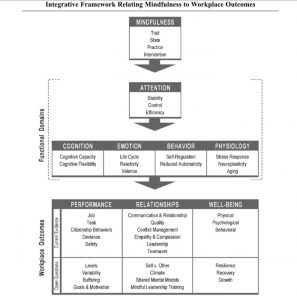Full report here
This research is aimed at adding to, and stimulating further, what it describes as the small but growing body of research in the management arena linking mindfulness to better workplace functioning. Much of the current evidence indicating positive impacts on attention, cognition, emotions, behaviour, and physiology, it highlights, comes from research in the fields of psychology, neuroscience, and medicine.
It examines this broader literature with the aim of raising insights applicable in the management context, which can also drive future research.
 Through examining research and evidence, the report builds a model (see image) showing how mindful practice, traits and states initially have an impact upon attention. This impact comes from being able to select where to place our attention, keeping it there and preventing it wandering off, whilst applying an economical use of attentional resources. This controlled of attention in turn impacts the functional areas of cognition, emotion, behaviour, and physiology, which then influence a wide variety of workplace outcomes. In considering these workplace outcomes, it suggests there are three categories of impact; performance, relationships and well-being.
Through examining research and evidence, the report builds a model (see image) showing how mindful practice, traits and states initially have an impact upon attention. This impact comes from being able to select where to place our attention, keeping it there and preventing it wandering off, whilst applying an economical use of attentional resources. This controlled of attention in turn impacts the functional areas of cognition, emotion, behaviour, and physiology, which then influence a wide variety of workplace outcomes. In considering these workplace outcomes, it suggests there are three categories of impact; performance, relationships and well-being.
As a meta-review it aims to sift the balance of evidence. So whilst it suggests there is current evidence for some impacts, it also describes some areas as being open questions, still to be fully researched (see lower part of the model). The report goes into more detail on each area impacted.
Overall its conclusion is that the meta-analytic evidence suggests mindfulness practices can have a strong impact on a range of outcomes. However, it also highlights that there is much research needed in the future in the area of application, and even suggests that the analysis of current research raises some challenges to key assumptions of general management theory as well. In conducting this early meta-analysis the report also shows how new this area of mindfulness as a workplace intervention is, and how there is a need for much more research into its effectiveness in this context.
